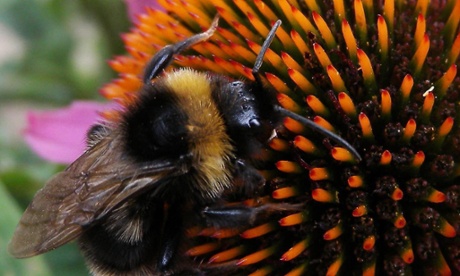
Experts fear smaller bees will be less effective at foraging for nectar and carrying out their vital task of distributing pollen.
Scientists in the UK conducted laboratory tests which showed how a pyrethroid pesticide stunted the growth of worker bumblebee larvae, causing them to hatch out reduced in size.
Gemma Baron, one of the researchers from the School of Biological Sciences at Royal Holloway, University of London, said: “We already know that larger bumblebees are more effective at foraging.
“Our result, revealing that this pesticide causes bees to hatch out at a smaller size, is of concern as the size of workers produced in the field is likely to be a key component of colony success, with smaller bees being less efficient at collecting nectar and pollen from flowers.”
Pyrethroid pesticides are commonly used on flowering crops to prevent insect damage.
The study, the first to examine the pesticides’ impact across the entire lifecycle of bumblebees, tracked the growth of bee colonies over a four month period.
Researchers exposed half the bees to a pyrethroid while monitoring the size of the colonies as well as weighing individual insects on micro-scales.
They found that worker bees from colonies affected by the pesticides over a prolonged period grew less and were significantly smaller than unexposed bees.
Findings from the study, funded by the Natural Environment Research Council (Nerc), appear in the Journal of Applied Ecology.
Professor Mark Brown, who led the Royal Holloway group, said: “Bumblebees are essential to our food chain so it’s critical we understand how wild bees might be impacted by the chemicals we are putting into the environment.
“We know we have to protect plants from insect damage but we need to find a balance and ensure we are not harming our bees in the process.”
Currently a Europe-wide moratorium on the use of three neonicotinoid pesticides is in force because of their alleged harmful effect on bees.
As a result, the use of other types of pesticide, including pyrethroids, is likely to increase, say the researchers.
Dr Nigel Raine, another member of the Royal Holloway team who will be speaking at this week’s national Bee Health Conference in London, said: “Our work provides a significant step forward in understanding the detrimental impact of pesticides other than neonicotinoids on wild bees.
“Further studies using colonies placed in the field are essential to understand the full impacts, and conducting such studies needs to be a priority for scientists and governments.”
The scientists sprayed the pesticide on the bees’ pollen feed at the concentration recommended for oilseed rape.
Colony growth and reproductive output were monitored for up to 14 weeks.
http://www.theguardian.com/environment/2014/jan/20/pesticides-making-bees-smaller
http://onlinelibrary.wiley.com/journal/10.1111/(ISSN)1365-2664/earlyview